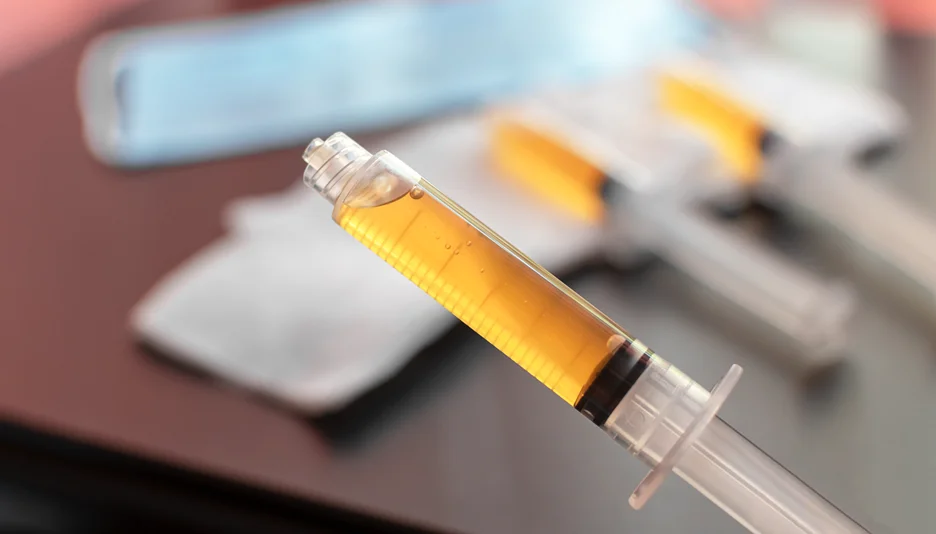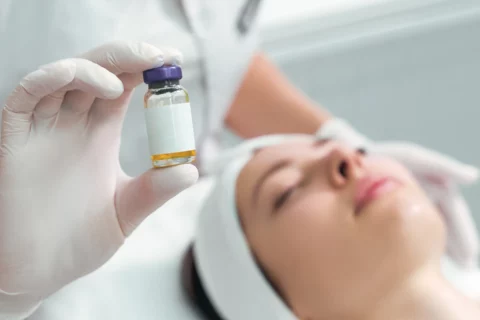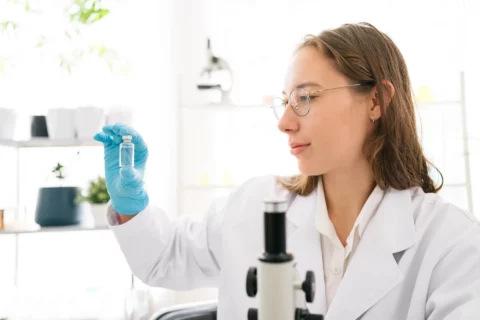Unlock the Regenerative Power of Stem Cells
Exosome therapy is an exciting new treatment that utilizes the natural healing properties of exosomes to promote tissue repair and slow signs of aging.
As we age, the number and quality of our stem cells decline, reducing the availability of regenerative exosomes. Exosome therapy aims to harness the potential of these extracellular vesicles to revitalize tissues and modulate inflammation. Treatment involves reintroducing an isolated concentration of exosomes to reactivate regeneration.
Exosome therapy is growing in popularity due to its advantages over stem cell therapies and its wide range of applications. However, as with any new treatment, there are still open questions around long-term effects and ideal procedures.
To help you make an informed decision about whether exosome therapy is right for you, this guide will walk through how it works, evidence for benefits, potential side effects and risks, and what to look for in a high-quality clinic.
What are Exosomes and How Does Exosome Therapy Work?

Exosomes are tiny vesicles released by stem cells that carry proteins, mRNA, miRNA, and other molecular cargo. They act as messengers between cells and play an important role in cellular communication and regulation.
Exosomes derived from stem cells, like mesenchymal stem cells, appear to retain many of the regenerative and anti-inflammatory properties of their parent cells. When isolated and delivered to tissues through injection or IV, they can transmit signals that kickstart healing in cells that have become inactive or dysfunctional.
Current exosome therapy utilizes exosomes derived from adult stem cells, such as mesenchymal stem cells. These are collected from sources like bone marrow, adipose tissue, umbilical cord blood, or amniotic fluid. The exosomes are then isolated through ultracentrifugation or proprietary extraction techniques.
Once collected, the exosomes are delivered back into the patient’s body through injections, IV drips, or nebulization. The exosomes are drawn to injured, inflamed, or aging tissues where they can activate regeneration through several mechanisms:
- Influencing cell proliferation, migration, and differentiation
- Modulating immune responses and inflammation
- Promoting angiogenesis and blood flow
- Protecting cells from apoptosis and fibrosis
- Activating stem cells resident in tissues
- Transferring nutrients, proteins, and genetic material
Compared to cell-based treatments like PRP or stem cell therapy, exosomes provide regenerative benefits without the risks of abnormal cellular growth. They are well-tolerated since they are derived from the patient’s own fluids.
Enhance Your Exosome Therapy with Premium Medical Supplies from Face Med Store
Benefits of Exosome Therapy

While more robust clinical trials are still needed, current research indicates exosome therapy may provide benefits for a wide range of degenerative conditions and aesthetic concerns.
Some of the potential benefits include:
Skin Rejuvenation
Exosomes can stimulate collagen production, accelerate wound healing, modulate inflammation, and inhibit melanin production. This makes them promising for rejuvenating aged, wrinkled, or sun-damaged skin.
Hair Growth
Through their abilities to stimulate cell proliferation and activation, exosomes may promote new hair follicles growth. Early studies show potential for exosome therapy use in treating hair loss.
Treats Musculoskeletal Injuries
By reducing inflammation and promoting tissue regeneration, exosome therapy appears effective in treating sports injuries, osteoarthritis, and musculoskeletal pain.
Slows Down Neurodegenerative Diseases
The anti-inflammatory and neuroprotective effects of exosomes indicate potential for slowing neurodegenerative diseases like Alzheimer’s, Parkinson’s, and ALS.
Improves Autoimmune and Cardiovascular diseases
Exosomes may help regulate immune responses and show early promise for improving conditions like multiple sclerosis and type 1 diabetes.
Through promoting angiogenesis, exosomes could also improve outcomes in ischemic heart disease. However, more research is needed on potential long-term risks.
Potential Side Effects and Risks
While research suggests exosome therapy is well-tolerated by most patients, there are some potential side effects and risks to consider:
Infection Risks
Bacterial or fungal contamination could occur during improper harvesting, isolation, or replication of exosomes. Strict sterile technique protocols must be followed.
Exosomes derived from bacteria, viruses, or other pathogens could theoretically transmit infection. Screening for contamination is critical. Any impurities or toxins from culture media used in the extraction process could lead to adverse reactions.
Inflammation and Immunogenicity
There is a chance of mild inflammatory response or localized swelling at the injection site. This normally resolves within a few days. Allergic reactions or immunogenicity are unlikely but possible if the patient has sensitivities to specific exosome proteins. Repeated injections could theoretically lead to increased immune response over time.
May Loss Integrity If Not Properly Handled
If exosomes are improperly handled, stored, or administered, they may lose integrity and become nonviable or ineffective. Variability in exosome isolation and replication methods can impact therapeutic potency.
Lack of standardization is an issue. Individual differences in exosome activity and function may affect treatment responses.
Long-Term Safety Unknowns
Possible risks like fibrosis or other chronic changes to tissues have not been studied extensively. Effects of multiple or high-dose treatments over time require more research.
Exosomes could theoretically increase cell proliferation rates or metabolic activity beyond normal levels, with unknown consequences.
Other Procedural Risks
As with any injection procedure, there may be pain, bleeding, nerve damage, or other issues if improper technique is used. Intravenous administration can very rarely cause infusion reactions or circulatory overload. Improper needle depth or site selection may lead to lack of treatment response.
To minimize safety risks, patients should thoroughly vet their exosome therapy provider for proper credentials, equipment, and sterile practices. While exosome therapies hold great promise, they remain investigational. More rigorous controlled studies on long-term impacts are still needed.
Stay Safe and Informed – Explore Essential Medical Supplies at Face Med Store
What to Look for in a High-Quality Exosome Therapy Clinic
As exosome therapies grow in popularity for various conditions, it is important to find a clinic that follows best practices and high standards when offering these cutting-edge treatments.
Here are the key factors to look for when evaluating an exosome therapy provider:
| Criteria | Description |
| Exosome Source | Reputable clinics will use exosomes derived from adult stem cells, such as mesenchymal stem cells (MSCs) obtained ethically from healthy donors. MSCs have been extensively researched and are known to secrete exosomes with therapeutic potential. Avoid clinics using exosomes from placentas, embryos, or other questionable sources. |
| Collection and Purification Methods | Exosomes should be collected under sterile conditions using ultracentrifugation, the gold standard method that yields the purest exosome preparations. Beware of clinics using inferior isolation techniques or failing to test for exosome purity. |
| Quality and Quantity Testing | Rigorous characterization of exosome quantity (particle number) and quality (protein and genetic content) is essential. Exosomes must be tested to ensure there is no contamination and the product contains the beneficial exosomal cargo. |
| Delivery Method | Intravenous (IV) administration is considered optimal for systemic effects and bioavailability. Other delivery routes may be suitable depending on the condition being treated. Avoid clinics offering untested delivery methods. |
| Provider Training | The clinic should be led by a licensed physician with formal training in regenerative medicine, including the clinical uses of exosomes. Beware of clinics with no medical doctor on staff. |
| Transparency | A high-quality clinic should be transparent about their exosome preparation methods, testing protocols, treatment procedures, and the existing evidence supporting their use. Avoid “secret formula” marketing hype. |
| Adherence to Regulations | Any clinic offering exosome therapy should operate in compliance with all federal and state regulations surrounding experimental therapies. Steer clear of clinics making excessive medical claims about exosomes. |
Thoroughly researching an exosome therapy clinic on all of these criteria helps ensure you have a safe, effective treatment experience.
As the research on exosomes continues to evolve, look for clinics that stay up to date on the latest standards and evidence-based practices.
Experience Quality Products and Excellent Service

At FaceMed Store, we provide high-quality, affordable medical supplies for healthcare professionals performing innovative treatments like exosome therapy. Our products offer comparable alternatives to more expensive brand name options, allowing you to reduce costs and maximize profits.
We carry the essentials like safety goggles, syringes, microcannulas, Hydra Needles, plasma pens, and more. New items are continuously added based on the latest demand.
Our knowledgeable customer service team is ready to assist with any questions and make sure you get the products you need quickly. We strive to deliver an exceptional shopping experience.
See for Yourself and Save!
Experience the FaceMed Store difference – shop our catalog of discounted supplies today. We stand behind the quality and competitive pricing of everything we offer.
Get started saving on the products you use most. We make it easy to reduce expenses and succeed in your practice. Reach out anytime with questions – we are here to help.






